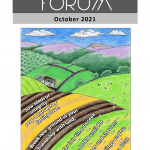webdev
October 2021 Forum
Thought for the Week – 26th September 2021
Spiritual Nourishment
For some reason , on Wednesday morning, I kept the radio on longer than usual, even though I had already started my day’s work. I had to go into the kitchen, where the radio lives, and was stopped in my tracks by a piece about an English Heritage initiative, to encourage people to be silent when they visited ruined monasteries, to just look and listen. It was introduced by a recording of bird song from Rievaulx Abbey and Stephen Fry waxing lyrical on the virtues of entering into the experience of the medieval monks and nuns. There was then a longer interview with one of the chief building specialists from English Heritage; I lost count of the number of times he used the word “spiritual” as he talked about the scheme. You can experience this peace yourself if you go to Buildwas Abbey, but you can also find it far closer to home, in any of the churches or churchyards in our locality. Coincidentally, on Thursday I led a short service of words, music and silence in Billingsley churchyard. Spirituality, that part of us that responds to the peace in places of worship, has nothing to do with whether you believe in God or not; Stephen Fry is an atheist. It is something all of us have, deep inside and which shapes our core values. We need to recognise this and nurture it. I cannot improve on the words of the English Heritage speaker; “Spiritual nourishment speaks to people of all faiths and none”.
Rev David Poyner
Thought for the Week – 19th September 2021
The Physical Presence
After 18 months, I have finally started going back into work. It’s certainly not the way I used to do it; at the moment it is one day a week, arriving later than I would normally and leaving earlier, to avoid the crowds on the train. But it has been a significant moment. What I have found most enjoyable is finally seeing colleagues face-to-face after such a long period of just viewing them on a computer screen. I have appreciated many aspects of working from home, including the convenience of the new virtual world where I don’t have to spend long periods travelling, but perhaps I missed being in the same physical space with friends more than I realised. A few months ago, I wrote about the importance of touch; the last couple of weeks have shown me the importance of the simple physical presence.
Christianity is a religion that cares a lot about our life in this world. At its heart is the belief that in the person of Jesus, God came to dwell amongst us, as a person. Perhaps, in my pleasure in being back physically with other people, we can catch a glimpse of God’s desire to be alongside us, sharing our triumphs and disasters. To be with other people is part of what it is to be fully human, to be the people we are called to be.
Rev David Poyner
Thought for the Week – 12th September 2021
I remember the afternoon of the 9th September 2001. I had just gone into the lab at work to do an experiment; as usual, the radio was on and Alex, my post-doc was busy. He turned to me and said “two planes have just hit the World Trade Centre”. I normally tried to shut the radio out when I was in the lab; Alex liked Radio 1 and I didn’t. But there wasn’t any music that afternoon; we just listened to horror unfolding. As the last few weeks have shown, we are still living the consequences of that day; blood is still being shed.
I’m often asked if my faith is a comfort when disaster strikes. I’m not sure it is; it certainly doesn’t stop the raw pain and anguish. But what it does do is provide me with a place where I can reflect. In the light of events like 9-11, I find myself turning to words of St Paul; words I also read at every funeral.
“I am convinced that neither death nor life, neither angels nor demons, neither the present nor the future, nor any powers, neither height nor depth, nor anything else in all creation, will be able to separate us from the love of God that is in Christ Jesus our Lord”.
Rev David Poyner
Thought for the Week – 5th September 2021
Shame
As the sad events in Afghanistan have unfolded, I’ve been struck by the number of people, often who served in there, commenting on the sense of shame they feel at the way we as a nation have treated those Afghans who helped our armed forces. I don’t think you need level any criticism at politicians to understand and share this feeling; to leave people behind, in fear of their lives, is a terrible thing, even if it may have been unavoidable. For different reasons, I am not always proud of some things that the Church has done; collectively we should feel shame at the way we have failed to protect vulnerable individuals from abusive priests and others.
There is however another side to shame and that is at ourselves; in church jargon, to think about our personal sins. Today we hear much talk about self-empowerment and we are encouraged to think positively about ourselves; in some quarters, to have any negative thoughts would appear to be sinful. Using fear of sin as a weapon of control is tantamount to abuse, but I worry that denial that we have any dark side is also damaging. We may need to go well beyond the traditional seven deadly sins, but characteristics such as anger, impatience, self-importance and undue ambition can all corrode us and injure those around us. I have been impressed by a recent speaker who challenged his listeners to recognise their favourite sin. Christian and Jewish teaching has always placed great emphasis on self-reflection and self-knowledge and if this is done honestly, I suspect it will reveal things about us all that we do not like. The aim of this is not that we then fall into a pit of self-hate and loathing, but rather that we are aware of our own weaknesses and so can better work around them, to live our lives to the fullest. Shame is collective and personal and in both cases, it can be a force for good if it brings about change.
Rev David Poyner

